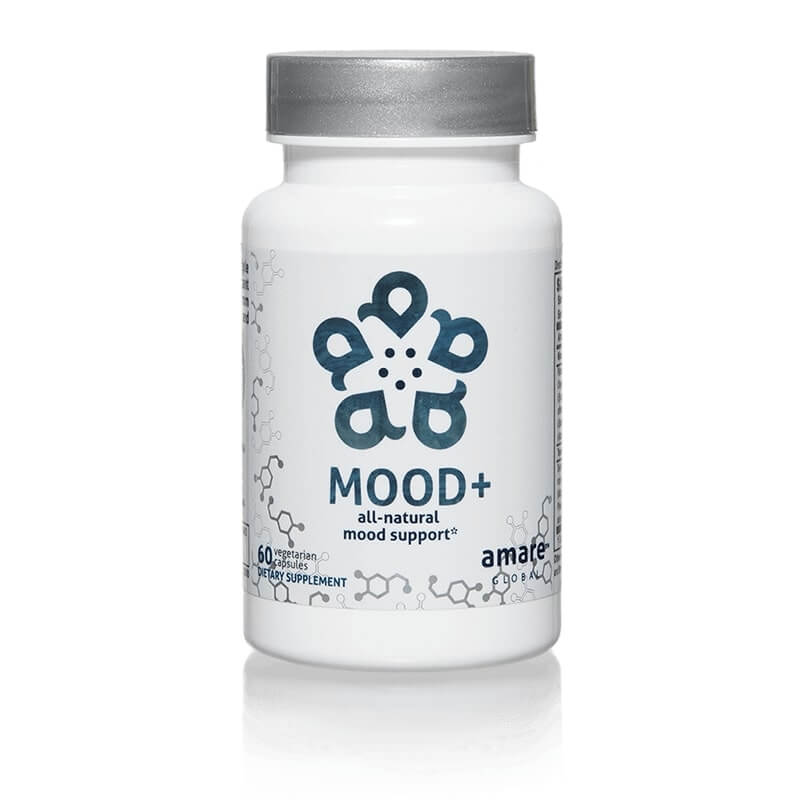Of all of the adaptogens, ashwagandha is the most well-known and most researched. It’s also been used for thousands of years, which is evidence of its safety and efficacy. Sensoril Ashwagandha is a patented form with a higher level of active compounds and at consistent levels, making it an ideal ingredient as a dietary supplement.
If you could use some stress support, would like to optimize your hormone levels, or are looking for a mental or physical performance edge, Sensoril Ashwagandha is a great place to start.

Try Mood+
Mood+ is an advanced, all-natural mood support product that addresses anxiousness, sadness, and restlessness. It includes Sensoril® Ashwagandha, Kanna, Rafuma, and Relora®. Key ingredients in the formula have been clinically shown to:
- Decrease feelings of anger by 42%
- Decrease feelings of sadness by 20%
- Reduce stress-related symptoms by 70%
What is Ashwagandha?
Ashwagandha, known scientifically as Withania somnifera, is an evergreen shrub that grows in Asia and Africa. It is also known as Indian ginseng or winter cherry.
It is commonly used for stress and is considered an “adaptogen,” which means it is believed to help the body resist physical and mental stress.
The plant contains chemicals that might help calm the brain, support normal blood pressure, and enhance the immune system.1
Ashwagandha has been used traditionally for a variety of health conditions, including insomnia, aging, anxiety, and many others.
Some studies have found ashwagandha is helpful with symptoms of generalized anxiety disorder (GAD), insomnia, and stress. Other studies show it enhances sleep quantity and quality and may help reduce stress-related weight gain.
The herb has also been shown to support normal inflammation levels and act as a powerful antioxidant. In Ayurvedic medicine, it is often promoted for stress and anxiety, sleep, male infertility, and athletic performance. Some evidence suggests that taking ashwagandha for 2 to 4 months may support testosterone levels.
What is Sensoril® Ashwagandha?
Sensoril Ashwagandha is a patented extract that differs from regular ashwagandha in several key ways.
First, Sensoril is made from both the leaves of the plant and the root of the ashwagandha plant, whereas regular ashwagandha extracts are typically derived from either the root or the leaves alone.
Because of how it’s extracted, Sensoril contains a higher concentration of withanolides, which are the active compounds in ashwagandha responsible for many of its health benefits. Sensoril is standardized to contain at least 10% withanolides, compared to a lower percentage in some other extracts.
With the higher concentration of active compounds, people can experience the health benefits with lower doses.
Finally, due to its higher withanolide content and the inclusion of leaf extracts, Sensoril is reported to have a more calming effect, which may be particularly beneficial for improving sleep and managing stress.
What does Sensoril Ashwagandha do?
Ashwagandha supports a variety of systems throughout the body, so it has a broad range of benefits. The following are the most common benefits attributed to ashwagandha.
- Stress and mood improvement: Ashwagandha has a pronounced effect on improving stress levels. A randomized, double-blind, placebo-controlled study in 2012 showed that Sensoril significantly reduced stress and feelings of anxiousness in people experiencing stress when compared to the placebo group.2 A 2017 study showed that supplementation with Sensoril improved overall mood and stress-related parameters.3
- Cognitive function: Ashwagandha is known for improving mental clarity. In healthy adults, Sensoril improved cognitive function and psychomotor performance.4 Another study showed that it improved memory, attention, and cognitive processing speed.5
- Physical performance: In a study published in 2015, adults taking ashwagandha improved endurance, strength, and post-exercise recovery.6
- Cardioprotective properties: Another study showed that supplementation supported healthy blood pressure and improved heart rate variability.7
- Supports restful sleep: A randomized, double-blind, placebo-controlled study examined the impact of Sensoril on sleep quality in adults with insomnia. Results suggested improvements in sleep, including sleep latency and total sleep time.8
- Enhanced immune function: Healthy people taking this form of Ashwagandha experienced enhanced immune function and increased levels of certain immune markers.9
- Reduced fatigue: A study in Integrative Cancer Therapies explored the effects of Sensoril Ashwagandha on chemotherapy-induced fatigue and quality of life in breast cancer patients. Results indicated significant improvements in fatigue levels and overall quality of life.10
- Reduced menopausal symptoms: A study published in the Journal of Ayurveda and Integrative Medicine on hormonal balance in menopausal women. Results indicated improvements in hormonal profiles and menopausal symptoms. The women also experienced improvements in sexual arousal, desire, and satisfaction.11
- Supports healthy blood sugar levels: A study in Phytotherapy Research investigated the effects of Sensoril Ashwagandha on glycemic control and insulin sensitivity in individuals with type 2 diabetes mellitus. Results showed improvements in fasting blood glucose levels and insulin sensitivity.12
- Supports thyroid function: In another study, patients with subclinical hypothyroidism who took Sensoril saw an improvement in thyroid levels.13
Beyond the specific Sensoril-related studies above, ashwagandha has also been shown to:
- help support normal inflammation levels
- act as an antioxidant
- protect nerve cells
- support the growth of good gut bacteria
- promote longevity and vitality
- increase energy levels
- support cardiovascular health
Practical Summary
Sensoril Ashwagandha extract is supported by numerous clinical trials. From improving stress resilience to supporting normal cortisol levels, it helps reduce the negative effects of stress, while also impoving cognitive function, energy levels, and overall health.
It’s been used for thousands of years and has a strong safety record.
That said, to experience the benefits, it’s crucial to use it consistently for weeks to months. You’ll often find it as part of a multi-ingredient, adaptogenic formula, though you can also find it as a single-ingredient supplement.

Feel Better Fast. Guaranteed.
Energy+, EDGE, and MentaBiotics make up the Happy Juice supplement stack, with ingredients clinically proven to:
- decrease anxiousness scores by 55%
- decrease irritability scores by 60%
- decrease fatigue by 64%
- decrease anger 54%
- decrease tension by 45%
- decrease confusion by 43%
- decrease overall distress by 49%
- increase good bacteria by 70%
- decrease negative mood by 105%
- increase positive mood by 211%
- Mikulska P, Malinowska M, Ignacyk M, Szustowski P, Nowak J, Pesta K, Szeląg M, Szklanny D, Judasz E, Kaczmarek G, Ejiohuo OP, Paczkowska-Walendowska M, Gościniak A, Cielecka-Piontek J. Ashwagandha (Withania somnifera)-Current Research on the Health-Promoting Activities: A Narrative Review. Pharmaceutics. 2023 Mar 24;15(4):1057. doi: 10.3390/pharmaceutics15041057. PMID: 37111543; PMCID: PMC10147008. ↩︎
- Chandrasekhar, K., Kapoor, J., & Anishetty, S. (2012). A prospective, randomized double-blind, placebo-controlled study of safety and efficacy of a high-concentration full-spectrum extract of Ashwagandha root in reducing stress and anxiety in adults. Indian Journal of Psychological Medicine, 34(3), 255–262. [DOI:10.4103/0253-7176.106022] ↩︎
- Choudhary, D., Bhattacharyya, S., & Joshi, K. (2017). Body weight management in adults under chronic stress through treatment with ashwagandha root extract: A double-blind, randomized, placebo-controlled trial. Journal of Evidence-Based Complementary & Alternative Medicine, 22(1), 96–106. [DOI:10.1177/2156587216641830] ↩︎
- Pingali, U., Pilli, R., & Fatima, N. (2014). Effect of standardized aqueous extract of Withania somnifera on tests of cognitive and psychomotor performance in healthy human participants. Journal of Dietary Supplements, 11(3), 171–182. [DOI:10.3109/19390211.2014.887032] ↩︎
- Chengappa, K. N. R., Bowie, C. R., Schlicht, P. J., Fleet, D., Brar, J. S., Jindal, R., … & Kupfer, D. J. (2013). Randomized placebo-controlled adjunctive study of an extract of Withania somnifera for cognitive dysfunction in bipolar disorder. Evidence-Based Complementary and Alternative Medicine, 2013, 1–11. [DOI:10.1155/2013/571420] ↩︎
- Wankhede, S., Langade, D., Joshi, K., Sinha, S. R., & Bhattacharyya, S. (2015). Examining the effect of Withania somnifera supplementation on muscle strength and recovery: A randomized controlled trial. Journal of the International Society of Sports Nutrition, 12(1), 43. [DOI:10.1186/s12970-015-0104-9] ↩︎
- Auddy, B., Hazra, J., Mitra, A., Abedon, B., Ghosal, S., Raychaudhuri, S., & Mukherjee, B. (2008). A standardized Withania somnifera extract significantly reduces stress-related parameters in chronically stressed humans: A double-blind, randomized, placebo-controlled study. Journal of Alternative and Complementary Medicine, 14(6), 621–627. [DOI:10.1089/acm.2008.0014] ↩︎
- Raut, A. A., Rege, N. N., Tadvi, F. M., Solanki, P. V., Kene, K. R., Shirolkar, S. G., … & Vaidya, A. B. (2012). Exploratory study to evaluate the tolerability, safety, and activity of Ashwagandha (Withania somnifera) in healthy volunteers. Journal of Ayurveda and Integrative Medicine, 3(3), 111–114. [DOI:10.4103/0975-9476.100168] ↩︎
- Biswal, B. M., Sulaiman, S. A., Ismail, H. C., Zakaria, H., & Musa, K. I. (2013). Effect of Withania somnifera (Ashwagandha) on the development of chemotherapy-induced fatigue and quality of life in breast cancer patients. Integrative Cancer Therapies, 12(4), 312–322. [DOI:10.1177/1534735412473666] ↩︎
- Sandhu, J. S., Shah, B., Shenoy, S., Chauhan, S., Lavekar, G. S., & Padhi, M. M. (2010). Effects of Withania somnifera (Ashwagandha) and Terminalia arjuna (Arjuna) on physical performance and cardiorespiratory endurance in healthy young adults. International Journal of Ayurveda Research, 1(3), 144–149. [DOI:10.4103/0974-7788.72485] ↩︎
- Dongre, S., Langade, D., & Bhattacharyya, S. (2015). Efficacy and safety of Ashwagandha (Withania somnifera) root extract in improving sexual function in women: A pilot study. BioMed Research International, 2015, 284154. [DOI:10.1155/2015/284154] ↩︎
- Usharani, P., Kishan, P. V., Kumar, C. U., & Singh, U. (2012). A comparative study to evaluate the effect of highly standardized aqueous extracts of Withania somnifera on endothelial dysfunction and biomarkers of oxidative stress in patients with type 2 diabetes mellitus. Phytotherapy Research, 26(6), 897–903. [DOI:10.1002/ptr.3660] ↩︎
- Shenoy, S., Chaskar, U., & Sandhu, J. S. (2018). Effects of eight-week supplementation of Ashwagandha on thyroid function in individuals with subclinical hypothyroidism. Biological Trace Element Research, 184(2), 366–370. [DOI:10.1007/s12011-017-1107-1] ↩︎



